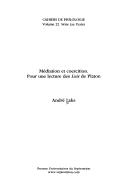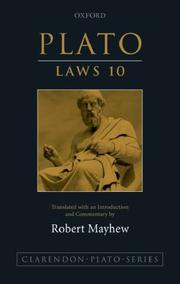| Listing 1 - 10 of 14 | << page >> |
Sort by
|
Book
ISBN: 0226776972 9780226776972 Year: 1975 Publisher: Chicago (Ill.): University of Chicago press
Abstract | Keywords | Export | Availability | Bookmark
 Loading...
Loading...Choose an application
- Reference Manager
- EndNote
- RefWorks (Direct export to RefWorks)
Plato --- Plato. --- Plato - Laws
Multi
ISBN: 9783896653765 3896653768 Year: 2006 Volume: v. 23 Publisher: Sankt Augustin Academia
Abstract | Keywords | Export | Availability | Bookmark
 Loading...
Loading...Choose an application
- Reference Manager
- EndNote
- RefWorks (Direct export to RefWorks)
Play. --- Jeu --- Plato. --- Plato. - Laws
Book
ISBN: 2711610217 9782711610211 Year: 1990 Publisher: Paris Vrin
Abstract | Keywords | Export | Availability | Bookmark
 Loading...
Loading...Choose an application
- Reference Manager
- EndNote
- RefWorks (Direct export to RefWorks)
Political science --- Philosophy --- Plato. --- Political science - Philosophy --- Plato. - Laws
Book
ISBN: 3896652613 9783896652614 Year: 2003 Volume: v. 15 Publisher: Sankt Augustin Academia-Verl.
Abstract | Keywords | Export | Availability | Bookmark
 Loading...
Loading...Choose an application
- Reference Manager
- EndNote
- RefWorks (Direct export to RefWorks)
Plato. --- Plato --- Plato - Laws - Congresses --- Platon (0427?-0348? av. J.-C.) --- Platon (0427?-0348? av. J.-C.). Les lois --- Critique et interprétation --- Plato - Laws
Book
ISBN: 9780190266172 0190266171 Year: 2015 Publisher: New York Oxford university press
Abstract | Keywords | Export | Availability | Bookmark
 Loading...
Loading...Choose an application
- Reference Manager
- EndNote
- RefWorks (Direct export to RefWorks)
What role did the performance of poetry, music, song, and dance play in the political life of the ancient city? How has philosophy positioned itself and articulated its own ambitions in relation to the poet tradition? The Polis and the Stage poses such questions through a reading of Plato last, longest, and unfinished work, the Laws. Plato's engagement with the Greek poetic tradition has long been recognized as foundational in the history of literary criticism, but the broader critical and philosophical significance of the Laws has been largely ignored. Although Plato is often thought hostile to mimetic art, famously banishing poets from the ideal city of the Republic, this book shows that in his final dialogue Plato made a striking about-face, proposing to rehabilitate Athenian performance culture and envisioning a city, in which poetry, music, song, and dance are instrumental in the cultivation of philosophical virtues. The psychological underpinnings of aesthetic experience and the power of mimetic art to predispose a society to specific kinds of constitutions are central themes throughout this study. Plato's views of the performative properties of language and genre receives systematic treatment in this study for the first time. Performance as a mechanism of sexual construction-a network of social practices uniquely suited to communicate and enforce normative conceptions of gender and erotic pleasure-is another focus, with special attention given to positions occupied by women in the culture envisaged in the Laws. As a whole, Marcus Folch's book provides an integrated interpretation of Plato's final dialogue with the Greek poetic tradition, an exploration of the dialectic between philosophy and mimetic art, which will be of interest to anyone concerned with understanding ancient Greek performance and the emergence of philosophical discourse in fourth-century Athens
Greek drama --- History and criticism. --- Plato. --- History and criticism --- Plato. - Laws --- Greek drama - History and criticism
Book
ISBN: 0405073240 9780405073243 Year: 1976 Publisher: New York (N.Y.): Arno Press
Abstract | Keywords | Export | Availability | Bookmark
 Loading...
Loading...Choose an application
- Reference Manager
- EndNote
- RefWorks (Direct export to RefWorks)
Plato --- Bibliography --- -Aflāṭūn --- Aplaton --- Bolatu --- Platon, --- Platonas --- Platone --- Po-la-tʻu --- Pʻŭllatʻo --- Pʻŭllatʻon --- Pʻuratʻon --- Πλάτων --- אפלטון --- פלאטא --- פלאטאן --- פלאטו --- أفلاطون --- 柏拉圖 --- 플라톤 --- -Bibliography --- Plato. --- Bibliography. --- Plato - Laws - Bibliography --- Plato - Laws
Book
ISBN: 2200345631 9782200345631 Year: 2005 Publisher: Paris Colin
Abstract | Keywords | Export | Availability | Bookmark
 Loading...
Loading...Choose an application
- Reference Manager
- EndNote
- RefWorks (Direct export to RefWorks)
Platonists --- Political science --- Republics --- Platoniciens --- Science politique --- République --- Philosophy --- Philosophie --- Plato. --- Plato --- Platonic philosophy --- Political philosophy --- Criticism --- République --- Political science - Philosophy --- Plato - Republic --- Plato - Laws
Book
ISBN: 9516532969 9789516532960 Year: 1998 Volume: 112 Publisher: Helsinki : Societas scientiarum fennica = Finska vetenskaps-societeten,
Abstract | Keywords | Export | Availability | Bookmark
 Loading...
Loading...Choose an application
- Reference Manager
- EndNote
- RefWorks (Direct export to RefWorks)
Griekenland --- Emotions (Philosophy) --- Plato --- Emotions (Philosophy). --- Griekenland. --- Philosophy --- Plato. --- Plato - Philebus --- Plato - Laws --- Platon (428-348 av. j.c.) --- Lois --- Critique et interpretation --- Philebe

ISSN: 09904476 ISBN: 2859399399 2757422693 9782859399399 Year: 2019 Volume: 22 Publisher: Villeneuve d'Ascq : Presses universitaires du Septentrion,
Abstract | Keywords | Export | Availability | Bookmark
 Loading...
Loading...Choose an application
- Reference Manager
- EndNote
- RefWorks (Direct export to RefWorks)
Les Lois de Platon constituent une œuvre majeure dans l’histoire de la pensée politique. La perspective systématique, qui remonte vers les fondements de la législation, s’y combine avec l’élaboration concrète de lois détaillées, ce qui les distingue de la République. Leur importance vient en outre et avant tout de ce qu’elles ont élaboré une série de concepts et de principes politiques appelés à un long avenir. Négativement, les Lois, en un contraste frappant avec la thèse du philosophe-roi de la République, thématisent pour la première fois le principe en vertu duquel « le pouvoir absolu corrompt absolument » (principe dit de Lord Acton). Positivement, les notions de « constitution mixte », de « règne de la loi », et de « préambule législatif » y trouvent leur première articulation conceptuelle, voire leur première formulation. Dernier ouvrage de Platon, les Lois restent un texte peu fréquenté, en dépit de leur importance obvie. C’est que, outre leur longueur, elles sont d’écriture difficile et opaques dans leur structure. Le présent essai vise à fournir, d’abord de manière synthétique, puis en commentant un certain nombre de passages, les éléments clefs permettant de s’orienter dans le maquis de développements dont elles sont faites. Il propose ce faisant une interprétation originale de la relation complexe que les Lois entretiennent avec la République, en mettant au centre de l’analyse la question de la relation entre loi et persuasion.
Platonic philosophy --- Plato --- History and criticism. --- Criticism --- Political science --- Administration --- Civil government --- Commonwealth, The --- Government --- Political theory --- Political thought --- Politics --- Science, Political --- Social sciences --- State, The --- Plato. --- Political science - Greece. --- Plato. - Laws. --- philosophie --- médiation --- coercition --- lois

ISBN: 9780199225965 0199225966 0199694729 9780199694723 0199694729 9780199694723 Year: 2008 Publisher: Oxford Oxford university press
Abstract | Keywords | Export | Availability | Bookmark
 Loading...
Loading...Choose an application
- Reference Manager
- EndNote
- RefWorks (Direct export to RefWorks)
The Laws is Plato's last and longest dialogue. Although it has been neglected (compared to such works as the Republic and Symposium), it is beginning to receive a great deal of scholarly attention. Book 10 of the Laws contains Plato's fullest defence of the existence of the gods, and his last word on their nature, as well as a presentation and defence of laws against impiety (e.g. atheism). Plato's primary aim is to defend the idea that the gods exist and that they are good - this latter meaning that they do not neglect human beings and cannot be swayed by prayers and sacrifices to overlook injustice. As such, the Laws is an important text for anyone interested in ancient Greek religion, philosophy, and politics generally, and the later thought of Plato in particular. Robert Mayhew presents a new translation, with commentary, of Book X of the Laws. His primary aim in the translation is fidelity to the Greek. His commentary focuses on philosophical issues (broadly understood to include religion and politics), and deals with philological matters only when doing so serves to better explain those issues. Knowledge of Greek is not assumed, and the Greek that does appear has been transliterated. It is the first commentary in English of any kind on Laws X for nearly 140 years.
Philosophy --- Political science --- State, The --- Religion and politics --- Science politique --- Etat --- Religion et politique --- Early works to 1800. --- Ouvrages avant 1800 --- Politics, Practical --- Politics and religion --- Religion --- Religions --- Religious aspects --- Political aspects --- Political science - Early works to 1800 --- State, The - Early works to 1800 --- Religion and politics - Early works to 1800 --- Plato. - Laws. - Book 10 --- Plato - Religion --- Plato
| Listing 1 - 10 of 14 | << page >> |
Sort by
|

 Search
Search Feedback
Feedback About UniCat
About UniCat  Help
Help News
News